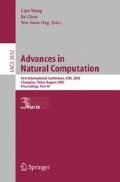Abstract
The paper proposed a novel quantum-inspired genetic algorithm with only one chromosome, which we called Single-Chromosome Quantum Genetic algorithm (SCQGA). In SCQGA, by bringing the information representation in quantum computing into the algorithm, only one quantum chromosome (QC) is used to represent all possible states of the entire population. A novel quantum evolution method without using conventional genetic operators such as crossover operator and mutation operator is proposed, in which according to the best individuals generated by QC we adjust the quantum probability amplitude with quantum rotation gates so that the QC can produce more promising individuals with higher probability in the next generation. The paper indicated that SCQGA is a new approach belonging to estimation of distribution algorithms (EDAs). Experiments on solving a class of combinatorial optimization problems show that SCQGA performs better than conventional genetic algorithm.
Access this chapter
Tax calculation will be finalised at checkout
Purchases are for personal use only
Preview
Unable to display preview. Download preview PDF.
References
Nobuyuki, M., Masato, T., Haruhiko, N.: Learning performance of neuron model based on quantum superposition. In: Proceedings of the 2000 IEEE International Workshop on Robot and Human Interactive Communication, Osaka, Japan. IEEE Press, Los Alamitos (2000)
Gopathy, P., Nicolaos, B.K.: Quantum Neural Networks (QNN’s): Inherently Fuzzy Feedforward Neural Networks. IEEE Transactions on Neural Network 8, 679–693 (1997)
Narayanan, A., Moore, M.: Quantum-inspired genetic algorithms. In: Proceedings of IEEE international Conference on Evolutionary Computation, pp. 61–66. IEEE Press, Piscataway (1996)
Ventura, D., Tony, M.: An Artificial Neuron with Quantum Mechanical Properties. In: Proceedings of the International Conference on Artificial Neural Networks and Genetic Algorithms, Norwich, England (1997)
Kak, S.: Quantum neural computing. Advances in Imaging and Electron Physics 94, 259–313 (1995)
Davide, A., Sandro, R., Fabio, R., Rodolfo, Z.: Quantum optimization for training support vector machines. Neural Networks 16, 763–770 (2003)
Rylander, B., Terry, S., James, F., Jim, A.: Quantum Evolutionary Programming. In: Proceedings of the Genetic and Evolutionary Computation Conference, pp. 1005–1011 (2001)
Martin, L., Perkowski, M.: Evolving quantum circuits using genetic algorithm. In: Proceedings of the 2002 NASA/DoD Conference on Evolvable Hardware (2002)
de Hugo, G., et al.: Quantum versus evolutionary systems: total versus sampled search. In: Proceedings of the 5th International Conference on Evolvable Systems, pp. 457–466 (2003)
Kuk-Hyun, H., Jong-Hwan, K.: Quantum-Inspired Evolutionary Algorithm for a Class of Combinatorial Optimization. IEEE transactions on evolutionary computation 6, 580–593 (2002)
Eleanor, R., Wolfgang, P.: An Introduction to Quantum Computing for Non-Physicists. ACM Computing Surveys 32, 300–335 (2000)
Baluja, S.: Population-Based Incremental Learning: A Method for Integrating Genetic Search Based function Optimization and Competitive Learning. Carnegie Mellon Univ., Pittsburgh, PA, Tech. Rep. (1994)
Mühlenbein, H.: The equation for response to selection and its use for prediction. Evolutionary Computation 5, 303–346 (1998)
Jeremy, S., De Bonet, et al.: MIMIC: Finding optima by estimating probability densities. Advances in Neural Information Processing Systems 9, 424–431 (1997)
Harik, G.R., Lobo, F.G., Goldberg, D.E.: The compact genetic algorithm. In: Proceedings of the IEEE Conference on Evolutionary Computation, pp. 523–528. IEEE press, Los Alamitos (1998)
Mühlenbein, H., Mahnig, T.: The Factorized Distribution Algorithm for additively decomposed functions. In: Proceedings of the 1999 Congress on Evolutionary Computation, pp. 752–759. IEEE press, Los Alamitos (2003)
Pelikan, M., Goldberg, D.E., Cantú-paz, E.: Linkage Problem, Distribution Estimation and Bayesian Networks. Evolutionary Computation 8, 311–340 (2000)
Pedro, L., Jose, A.L.: Estimation of dstribution algorithm: A new tool for evolutionary compuation. Kluwer Academic Publishers, Dordrecht (2002)
Author information
Authors and Affiliations
Editor information
Editors and Affiliations
Rights and permissions
Copyright information
© 2005 Springer-Verlag Berlin Heidelberg
About this paper
Cite this paper
Zhou, S., Sun, Z. (2005). A New Approach Belonging to EDAs: Quantum-Inspired Genetic Algorithm with Only One Chromosome. In: Wang, L., Chen, K., Ong, Y.S. (eds) Advances in Natural Computation. ICNC 2005. Lecture Notes in Computer Science, vol 3612. Springer, Berlin, Heidelberg. https://doi.org/10.1007/11539902_17
Download citation
DOI: https://doi.org/10.1007/11539902_17
Publisher Name: Springer, Berlin, Heidelberg
Print ISBN: 978-3-540-28320-1
Online ISBN: 978-3-540-31863-7
eBook Packages: Computer ScienceComputer Science (R0)

